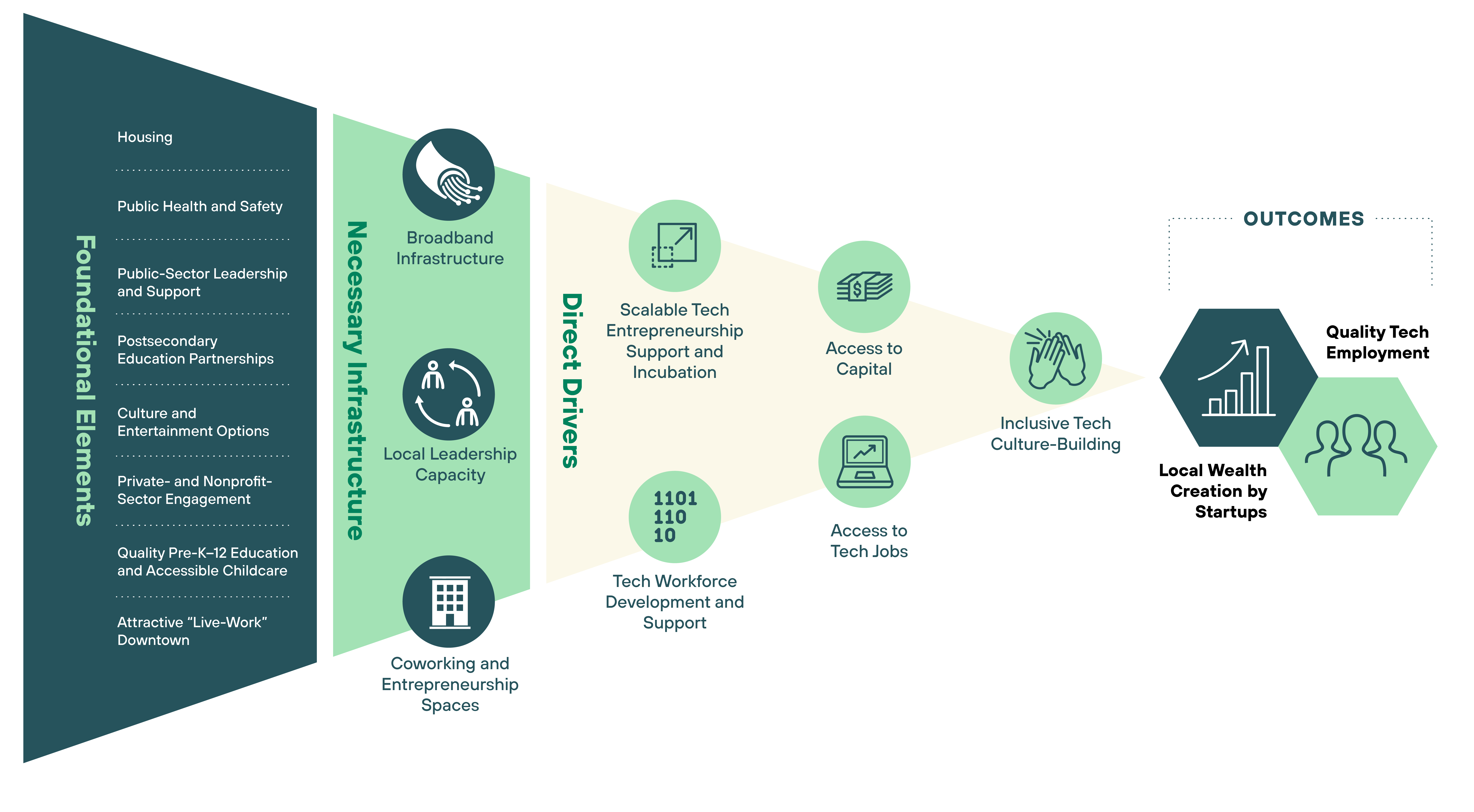Direct driver: Inclusive tech culture building
For a rural place to become an entrepreneurial center, people need to actively believe it’s possible — and that everyone, from all racial, gender, educational, class, and professional backgrounds are truly included in those tech opportunities.
What are direct drivers of a tech economy?
How does a rural place build a thriving tech economy ecosystem? At the Center on Rural Innovation, answering that question — and helping communities put those answers into practice — is a core part of our mission.
Based on our deep experience in rural economies, on-the-ground work providing technical assistance on tech-based economic development with rural communities across the country, and intensive data analysis, we have identified five direct drivers of rural tech economy ecosystems — the elements that enable communities to successfully compete in the tech economy: scalable tech entrepreneur support and incubation; tech workforce development and support; access to capital; inclusive tech culture building; and access to tech jobs. As part of our work, we help rural communities — who each come to the table with different assets and strengths — develop strategies for implementing each of these drivers.
In this five-part blog series, we dive into each direct driver — defining it, explaining its purpose, highlighting rural communities in our Rural Innovation Network that exemplify doing it well, and offering tips on how other communities can drive their own success.
Direct driver No. 5: Inclusive tech culture building
At the Center on Rural Innovation, we define inclusive tech culture building as a direct driver like this:
Inclusive tech culture is about creating a culture of collaboration and establishing new values and community norms that emphasize the importance of building a diverse ecosystem centered around technology and innovation. Part of this culture requires a community-wide mindset that it’s truly possible to build and sustain scalable tech startups and a tech economy ecosystem.
Critical to long term success is that this ecosystem is inclusive of people from all racial, gender, educational, and professional backgrounds. Within this diverse ecosystem, tech workers and tech entrepreneurs need to be supported and attracted by a culture that actively embraces a tech economy. This includes organizations and groups dedicated to promoting entrepreneurship and the tech economy, breaking down barriers to inclusion, increasing community-wide understanding of technology, and creating opportunities for diverse groups to connect, cowork, network, collaborate, and exchange knowledge and ideas.
What it takes to build an inclusive culture of technology
There are lots of technical and infrastructural aspects to building a rural tech economy. There’s also something yet equally important: an inclusive and supportive culture. For a rural place to become an entrepreneurial center, people need to actively believe it’s possible — and that everyone, from all racial, gender, educational, class, and professional backgrounds are truly included in those tech opportunities. Residents need to see tech as a plausible career path and need to have the community’s support for entrepreneurship as a core endeavor.
Culture building is about changing norms and practices so technology and the tech economy become embedded as part of a community’s identity. There’s lots of ways to do this. Storytelling is a powerful one. This can include features of entrepreneurs in the local paper, events that bring together entrepreneurs, and other events that connect local tech workers with each other.
It’s also crucial to make sure that from the start, the entrepreneurial culture that a community builds is inclusive, in every sense of the word. Tech ecosystems can only succeed when every part of the community has real access to participating in tech and innovation, with diversity, equity, and inclusion core components of how the community understands its success. Challenging stereotypes about who can participate in tech in rural areas while actively promoting diverse examples of rural tech success stories can shift the narrative and open possibility to everyone who seeks to take advantage of it.
While inclusive tech culture building is sometimes harder to measure, these rituals, values, and norms are what spur entrepreneurs to innovate. Rural communities often have a longstanding identity, possible as a manufacturing community or an agricultural community. Inclusive tech culture building is about adding to that, making sure that technology and entrepreneurship are embedded within the community’s vision for its own future.
Success stories from the Rural Innovation Network
- Marquette, Michigan: Innovate Marquette Smartzone has an innovative marketing campaign called Make It In Marquette. Their goal is two-fold: First, to show that Marquette is a town where entrepreneurs can make their products (and their impact); and second, to prove that anyone can “make it” in Marquette, a beautiful place with a resilient economy.
- Wilson, North Carolina: Gig East, a hub for innovation and community in Wilson, ran the Gig East Virtual Summit in November 2020. The event was a perfect example of how a community can use events to channel momentum for a shared culture built on the idea that rural America can be home to innovation and entrepreneurship. Our founder Matt Dunne was even there to advocate for his “unrelenting optimism for rural America.”
- Platteville, Wisconsin: When staff at the University of Wisconsin-Platteville and SWWRPC were writing their Build to Scale Venture Challenge grant, they explicitly recognized the need to change the culture for Platteville to become more entrepreneurial. They identified a local culture that looks down on failure, so they pledged to work towards a more innovation-friendly culture where experimentation is encouraged.
- Our communities are also engaging to enhance the inclusion and diversity of their programming. In Portsmouth, Ohio, the Kricker Innovation Hub hired a dedicated staff member to focus on engaging people in the opioid recovery community; Shaping Our Appalachian Region (SOAR) in Pikeville, Kentucky is offering the Women Founders CO.STARTERS Cohort; in Traverse City, Michigan, 20Fathoms launched a Women in Tech Meetup this year; and across the rest of our Network, communities are working to build inclusion into every part of their practice.
Strategy tips
- Be inclusive in your outreach and representation. In a small community, a culture of entrepreneurship only works if people from all groups and backgrounds feel included and have real access to opportunity. That means reaching out to form ecosystems that represent everyone in the community, breaking down demographic barriers to access, prioritizing equity as a non-negotiable ecosystem goal, and designing programming efforts to expand who can see themselves and become tech economy participants.
- Be evangelists for your community’s ecosystem. Culture building takes work, and that means it takes a group of people committed to making sure entrepreneurship is visible in the community. Leaders can come from any organization, but the common thread is working together to promote successful tech workers and innovators and make space in the community’s narrative for entrepreneurship to take a major stage.
- Host events and meetups. Events can go a long way towards opening people’s eyes towards the possibilities they can take advantage of locally. Fireside chats with founders, panels with business leaders, and meetups for interested workers are examples that build camaraderie and spur a tech narrative.
Conclusion
Tech ecosystems are holistic, and an inclusive culture of innovation entrepreneurship holds them together. When rural communities make space for all their residents to believe that they too can be home to entrepreneurs, startups, and innovators — and act on that belief, with the community’s full support — the possibilities are limitless.
Keep reading
Interested in learning about our other direct drivers? You can read about each of them here:
- Direct driver: Access to capital
- Direct driver: Scalable entrepreneur support and incubation
- Direct driver: Tech workforce development
- Direct driver: Access to tech jobs
Stay connected
To meet the Rural Innovation Network communities doing ecosystem building in small towns across the country, you can find a list here.
If you are a community interested in working with us to grow or build your own digital economy ecosystem, please contact us.

